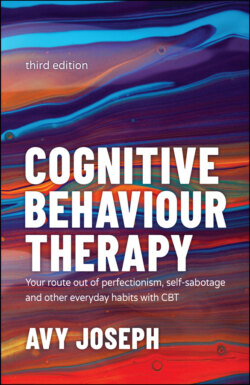Читать книгу Cognitive Behaviour Therapy - Avy Joseph - Страница 11
Is it true that events or people make us do what we do?
ОглавлениеLet's think about what we do and assume that situations or people make us behave as we do.
A colleague criticizes you = You start avoiding them
If it is true that a colleague's criticism ‘made’ you avoid them, this means that every criticism made by your colleague would have the same effect on everyone. It means that avoidance is the only possibility whenever your colleague criticizes you, or anyone else for that matter.
A colleague criticizes 10 people = 10 people avoid them
A colleague criticizes 100 people = 100 people avoid them
A colleague criticizes 1000 people = 1000 people avoid them
Does this make sense?
The problem is that people say, ‘he made me do it’ or ‘she made me lose my temper’. It is as if they have absolutely no control over their behaviour. Once again, if we do not have a part to play in how we behave, then we would be completely stuck, unable to move forward, learn or do anything useful. Is this what you see happening to everyone around you?
So what provokes your feelings and behaviour? Most of the time the simple answer is that you do. You provoke your feelings and actions by the way you think, the attitudes you've formed, the habits you no longer question and the beliefs you hold.
This is the principle of Emotional Responsibility: You are largely responsible for the way you feel and act.
The principle of emotional responsibility can be challenging, particularly if you are going through a difficult time or have experienced trauma or personal tragedy. It's natural to feel angry, sad, depressed or hurt in response to accidents, illness and other challenges in life, but if you get stuck in these feelings then you can change them.
The thought manifests as the word; The word manifests as the deed; The deed develops into habit;
And habit hardens into character;
So watch the thought and its ways with care. (Buddha)
The way you think about something affects how you feel and how you behave. Here are some examples:
If you think that your partner's late arrival for dinner proves that you are not lovable then you might feel hurt and sulk.
If you think that your partner was nasty and selfish because they arrived late for dinner then you might feel angry and shout.
If you think that your partner's late arrival for dinner is no big deal then you can feel calm about it and ask what happened.
This shows that it is not the situation or what happens to us that provokes our feelings and behaviour. It is the way we think about the situation. The way we think about something can then influence how we behave.
